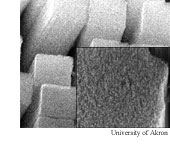|
NEWS
|
Sugar, sugar
A pair of developments advance efforts to use
plant matter in place of petroleum to produce fuel and
plastics. A liquid fuel derived from fructose has a 40%
higher energy density and is more stable than ethanol.
And chromium chloride turns out to be an effective catalyst
for converting glucose to the chemical precursor to plastics.
(Production
of Dimethylfuran for Liquid Fuels from Biomass-derived
Carbohydrates, Nature, June 21, 2007; Metal
Chlorides in Ionic Liquid Solvents Convert Sugars to 5-Hydroxymethylfurfural,
Science, June 15, 2007)
Super gecko tape
 Microscopic patterns of carbon nanotubes that
mimic gecko's feet yield an adhesive tape that's four
times stronger in sticking to surfaces than the lizard's
feet. The adhesive is dry, conducts electricity and can
be peeled off and reused. (Carbon
Nanotube-based Synthetic Gecko Tapes, Proceedings
of the National Academy of Sciences, published online
June 19, 2007)
Microscopic patterns of carbon nanotubes that
mimic gecko's feet yield an adhesive tape that's four
times stronger in sticking to surfaces than the lizard's
feet. The adhesive is dry, conducts electricity and can
be peeled off and reused. (Carbon
Nanotube-based Synthetic Gecko Tapes, Proceedings
of the National Academy of Sciences, published online
June 19, 2007)
Bone-shaking network
A data network that uses vibrations traveling
through bones offers a low-power, secure, though slow,
alternative to wireless networks like Bluetooth. The networking
technology, OsteoConduct, could be used for communication
among devices implanted in or worn on the body. One possible
use is answering a phone call through a Bluetooth headset
by clacking your teeth. (OsteoConduct:
Wireless Body-Area Communication based on Bone Conduction,
Second International Conference on Body Area Networks
(BodyNets), Florence, Italy, June 11-13, 2007)
Steerable Net access
Aiming directional antennas the right way gives
moving vehicles faster, longer-lasting wireless Internet
access. In addition to better Net surfing in moving cars,
the technique is a means for vehicles to communicate with
each other and with roadside devices to improve traffic
safety. (MobiSteer:
Using Steerable Beam Directional Antenna for Vehicular
Network Access, 5th International Conference on Mobile
Systems, Applications, and Services (MobiSys 2007), San
Juan, Peurto Rico, June 11-14, 2007)
Internet's shape
A research team has analyzed a map of about 20,000
Internet subnetworks, or autonomous systems, noting how
far away each is from the Internet's core. They found
that the Internet can be divided into three parts: a nucleus
of about 100 subnetworks including Google, a middle layer
of about 15,000 peer-connected subnetworks, and a periphery
of about 5,000 subnetworks that connect only through the
nucleus. (A
Model of Internet Topology Using K-Shell Decomposition,
Proceedings of the National Academy of Sciences,
published online June 22, 2007)
Quantum bus
A chip-based quantum computer design borrows from
ordinary computers the idea of a bus or central element
that ties the computer's components together. The spin
bus could make it easier to build solid-state quantum
computers, which promise to crack secret codes and speed
database searches. (Efficient
Multiqubit Entanglement via a Spin Bus, Physical
Review Letters, June 8, 2007) |
FEATURES
|
View
from the High Ground: ICL's John Pendry
Physics as machine tool, negative refractive
index, metamaterials, shattered wine glasses, higher capacity
DVDs, scientific backwaters, risk perception and practice,
practice, practice.
|
How
It Works: Quantum computing: qubits
Photons, electrons and atoms, oh my! These particles are
the raw materials for qubits, the basic building blocks
of quantum computers. |
|
 |
News RSS feed 
Blog RSS feed 
Bookshelf RSS feed

New: TRN's
Internet Services
TRN's Jobs Center
|
| |
|
| |
|
| |
"Physics
is to the rest of science what machine tools are
to engineering. A corollary is that science places
power in our hands which can be used for good or
ill. Technology has been abused in this way throughout
the ages from gunpowder to atomic bombs."
- John Pendry, Imperial College London |
|
| |
|
| |
Thanks
to Kevin from
GoldBamboo.com
for technical support |
|

